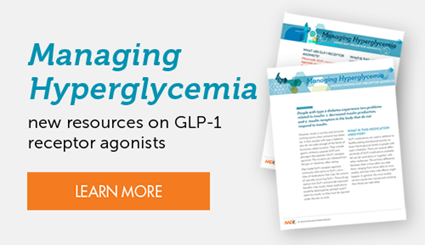Benefits of Including Community Health Workers (CHWs) on the Diabetes Care Team
Apr 26, 2019, 06:00 AM
 by Betsy Rodriguez BSN, MSN, DE
by Betsy Rodriguez BSN, MSN, DE
Senior Public Health Advisor
Division of Diabetes
Centers for Disease Control and Prevention
Barriers to optimal diabetes management are complex and involve individual, community and health-system factors. From poor access to care to lack of culturally tailored approaches, the barriers are often multifaceted.[1]
Effective management of diabetes requires that people living with diabetes be active participants in their own care and follow their treatment plan as prescribed by their care team, which involves complex schedules for monitoring glucose and taking medications, as well as significant lifestyle changes (e.g., daily exercise, dietary changes). Many factors can make self-management of diabetes difficult and overwhelming to people living with diabetes, for example:
- Difficulty incorporating monitoring, treatment, and physical activity into their lifestyle
- Low capacity for understanding health concepts (low health literacy, low numeracy, or language barriers)
- Psychosocial issues that prevent self-care (depression, lack of support)
- Poor mobility or other health issues that prevent self-care
- Financial barriers to paying for medications or services
- Transportation issues that hamper regular office visits
- Limited access to healthy, fresh foods [2]

The most frequently reported CHW roles on care teams are:
- Helping people gain access to medical services
- Advocating for individual needs
- Teaching people how to use health care and social services
- Helping people manage chronic conditions like diabetes. [3]
CHWs typically work in their own communities, share cultural, economic, linguistic and other characteristics with the people they serve, and are able to build close, trusting relationships with communities.
People of ethnic or racial minorities experience a disproportionate burden of disease and complications. Therefore, interventions that effectively reach underserved communities are especially important. The engagement of CHWs as a workforce is a proven strategy for improving diabetes outcomes. Not only do CHWs address individual-level factors, but often community-level factors and social determinants of health as well. CHWs typically work in their own communities, share cultural, economic, linguistic and other characteristics with the people they serve, and are able to build close, trusting relationships with communities. They can serve as a bridge between the health care system and the community because of their unique knowledge, cultural competency, and close relationship with the community.
[4] There is a growing body of evidence supporting the role of CHWs in diabetes care and type 2 diabetes prevention. In 2016, The Community Preventive Services Task Force (CPSTF) recommended interventions engaging CHWs for type 2 diabetes prevention to improve glycemic (blood sugar) management and weight-related outcomes among people at increased risk for type 2 diabetes. Evidence indicates these interventions are cost-effective and reduce rates of progression to type 2 diabetes. Interventions implemented in underserved communities may improve health, reduce health disparities, and enhance health equity. In 2017, CPSTF also recommended interventions engaging CHWs to help people with diabetes manage their diabetes. The recommendation is based on a systematic review that shows individuals who received these interventions improved their glycemic and lipid management and reduced their health care use. Additionally, the available economic evidence suggests these interventions are cost-effective. Team-based strategies are now widely adopting CHWs as members of the diabetes care team because they are realizing this could be an effective strategy to help people manage their diabetes.
CHWs play several roles in diabetes self-management, including providing structured education, ongoing support, and health system advocacy. I encourage you to embrace CHWs in your team-based strategies. You will not regret it! To learn more, read the new AADE practice paper.
References
[1] Shah M, Kaselitz E, Heisler M. The role of community health workers in diabetes: update on current literature [published correction appears in Curr Diab Rep. 2013;13(4):600]. Curr Diab Rep. 2013;13 (2):163–171. doi:10.1007/s11892-012-0359-3.
[2] Powers MA, Bardsley J, Cypress M, Duker P, Funnell MM, Fischl AH, Vivian E. Diabetes self-management education and support in type 2 diabetes: a Joint position statement of the American Diabetes Association, the American Association of Diabetes Educators, and the Academy of Nutrition and Dietetics. The Diabetes Educator. 2017;43(1):40–53. https://doi.org/10.1177/0145721716689694.
[3] Allen C, Escoffery C, Satsangi A. Brownstein JN. Strategies to improve the integration of community health workers into health care reams: a little fish in a big pond. Preventing Chronic Disease.2015;12:E124.
[4] Centers for Disease Control and Prevention. Addressing Chronic Disease Through Community Health Workers: A Policy Brief on Community Health Workers. Atlanta, GA: US Dept. of Health and Human Services; 2015. https://www.cdc.gov/dhdsp/docs/chw_brief.pdf.